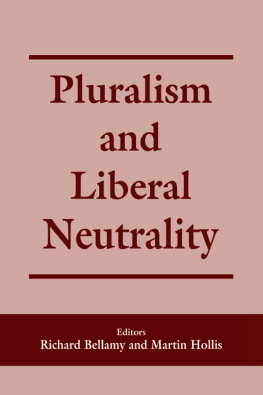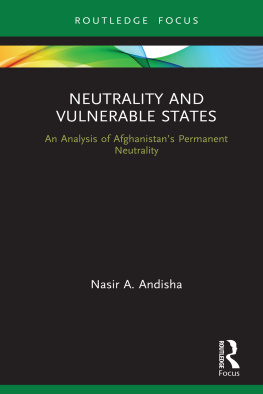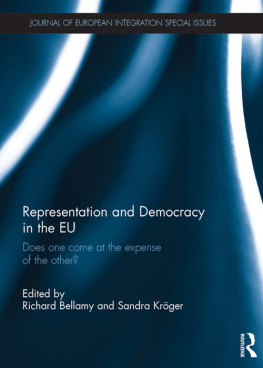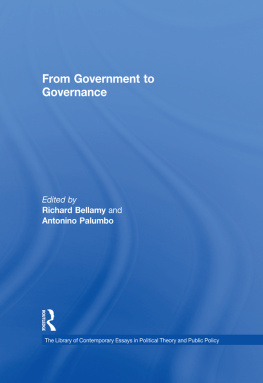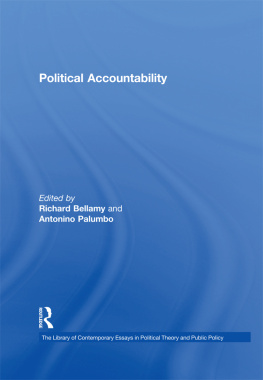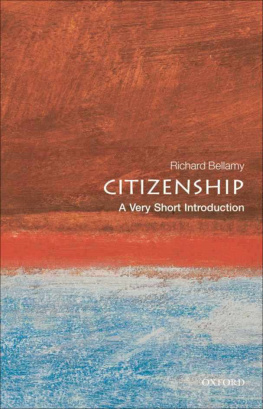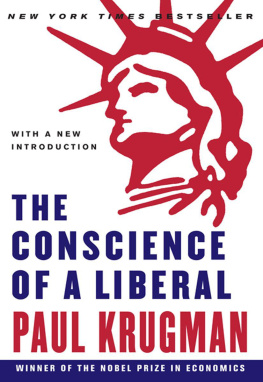PLURALISM AND LIBERAL NEUTRALITY
Books of Related Interest
FRIENDSHIP
Edited by Preston King and Heather Devere
Vol. 1: Dominant Paradigm of Antiquity
Vol.2: Friendship in Hieratic Religions
Vol.3: Friendship in Modernity
Vol.4: Anthropological/Cultural Approaches to Friendship
FOUCAULT
Edited by Robert Nola
THE IDEOLOGY OF ORDER
A Comparative Analysis of Jean Bodin and Thomas Hobbes
Preston King
TOLERATION
Preston King
MARTIN HOLLIS
(1938-98)
Martin Hollis died on 27 February 1998. In spite of his illness he followed the progress of this volume with interest and saw the final manuscript through to the publisher. It is dedicated to his memory.
Pluralism and Liberal Neutrality
Edited by
RICHARD BELLAMY and MARTIN HOLLIS
First published in 1999 in Great Britain by Routldge
2 Park Square, Milton Park, Abingdon, Oxon, OX14 4RN
270 Madison Ave, New York NY 10016
Transferred to Digital Printing 2006
Website: http://www.routldge.com
Copyright 1999 Routldge
British Library Cataloguing in Publication Data
Pluralism and liberal neutrality
1. Liberalism 2. Pluralism (Social sciences) 3. Consensus (Social sciences) 4. Individualism I. Bellamy, Richard II. Hollis, Martin 320.5`1
ISBN 0 7146 4916 3 (cloth)
ISBN 0 7146 4470 6 (paper)
Library of Congress Cataloging in Publication Data
Pluralism and liberal neutrality / edited by Richard Bellamy & Martin Hollis
p. cm.
Includes index.
ISBN 0-7146-4916-3 (hbk). ISBN 0-7146-4470-6 (pbk.)
1. Political ethics. 2. Pluralism (Social sciences) 3. Liberalism. I. Bellamy, Richard (Richard Paul) II. Hollis, Martin.
HA79.P73 1998 320.5 dc21 |
98-20005 CIP |
This group of studies first appeared in a Special Issue on Pluralism and Liberal Neutrality of Critical Review of International Social and Political Philosophy (Autumn 1998) ISSN 1369-8320 published by Routldge
All rights reserved. No part of this publication may be reproduced, stored in a retrieval system or transmitted in any form, or by any means, electronic, mechanical, photocopying, recording or otherwise, without the prior permission of the publisher of this book.
Publishers Note
The publisher has gone to great lengths to ensure the quality of this reprint but points out that some imperfections in the original may be apparent
Contents
George Crowder |
Simon Caney |
Anna Elisabetta Galeotti |
Richard Bellamyand Martin Hollis |
Tariq Modood |
Andrew Mason |
Samantha Ashenden |
John Arthur |
Timothy OHagan |
Plural societies mean divided loyalties. We recognise this in the competing claims of ideology, ethnicity, gender, religion and locality. We face it in dealing with people and institutions whose outlook differs from ours. We feel it in ourselves, when duties to family and fellow citizens, to friends and strangers, pull us apart.
This growing social pluralism unsettles the theory and practice of politics. Modern states rely on collective agreements to bind citizens with divergent loyalties, interests and ideals. Yet can they count on an overlapping consensus in practice or a reflective equilibrium in theory? Can they respect diversity and yet command an uncoerced allegiance?
Liberals have usually answered by defending the neutrality of a liberal framework consisting of a set of fair procedures which hold the ring for groups and individuals and let them pursue their own good in their own way. Yet is neutrality possible? Perhaps a liberal polity can deal neutrally between citizens who accept the framework. But even this is not obvious, where consensus is thin and underlying reasons for subscribing to it are thick and divergent. Meanwhile, how can there be neutrality between subscribers to a liberal consensus and other groups whose loyalties, interests and ideals contradict liberal notions of fair play?
The theme of this issue is thus tensions between pluralism and liberalism. As editors, we presume neither that they can be resolved, nor that they cannot. We presume only that new forms of pluralism are adding to the pressure in ways which give pluralists pause and liberals cause to rethink. The rest is up to the contributors.
RPB
JMH
GEORGE CROWDER
In the literature of contemporary social and political theory, pluralism is usually taken to mean the multiplicity of beliefs and ways of life that are characteristic of modern society. But pluralism sometimes has a different (although related) meaning, which I shall signal with the term value pluralism. This refers not to peoples contingent beliefs about value, but rather to what actually is valuable or good for human beings independent of their beliefs about these matters. Value pluralism thus includes the idea of moral objectivity: there are certain things that are good for human beings whatever they happen to believe. It adds to this the distinctively pluralist view that these objective goods are also irreducibly multiple because incommensurable they cannot be comprehended under the same measure. There is no super-value to which all other goods contribute more or less. Rather, the basic human goods (which may include liberty, equality, justice, loyalty, knowledge, and so on) are independent sources of value and of ethical argument. This means that there can be no absolute or final ranking of the basic goods: in some cases liberty, say, will come before equality, in other cases the opposite.1
Assuming that value pluralism is true, what is the relation between it and liberalism? Some writers have supposed that there is an intimate link between the two such that the truth of value pluralism implies the justification of liberal institutions in a fairly unproblematic way. Isaiah Berlin, for example, argues that the plurality of values implies an inescapable need to choose among rival goods, hence a commitment to freedom of choice which is best realised under liberalism.2 On the other hand, writers such as John Kekes and John Gray see value pluralism as undermining much of liberal political philosophy, since to justify liberalism is to privilege a particular package of goods (including tolerance, autonomy and diversity) over others. If we cannot give good reasons for such a ranking, then we cannot provide the kind of philosophical foundation for liberalism that its theorists have traditionally sought.3
Which is the better view? We should begin by separating two questions.4 First, does value pluralism undermine the possibility of reasoned argument for liberalism? Here I shall argue that value pluralism does not rule out a reasoned case for liberalism if that case is suitably contextual. On this first issue there is now considerable agreement. A second question is more controversial, however, and this will be my main concern. Even if we allow that incommensurability does not rule out some reasoned case for liberalism, it is a further question whether pluralism itself positively generates such a case. I have argued elsewhere that the truth of value pluralism has no tendency to advance the justification of liberalism: pluralism tells us that we must make hard choices among competing goods, but it does not obviously follow what those choices should be.5 However, I now believe that although previous attempts to move from value pluralism to liberalism have not been convincing, some such argument may yet succeed. In this paper, I explore two possible lines of argument from pluralism to liberalism: first, a contextual argument, according to which pluralism gives us reason to attend to context and hence may support a contextual case for liberalism; second, a universal argument, under which the pluralist outlook commits us to valuing a diversity of goods and ways of life that a liberal framework best accommodates. I shall take these arguments as far as I can, although in the space available the case I set out will inevitably amount to no more than an outline. I shall not attempt to show that value pluralism is true; my question is, supposing that it is so, what are its implications? I do not claim that pluralism provides the only, or even the most important, basis for liberalism, merely that it adds a significant string to the liberal bow.


